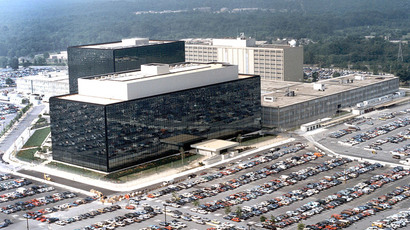Surveillance court moving toward renewal of NSA spying program for 6 months

The secretive court that oversees US government spying requests has indicated that it will temporarily renew the National Security Agency's bulk phone records collection authority despite a new reform law that ended the dragnet.
The Foreign Intelligence Surveillance Court (FISC) – often seen as a compliant "rubber stamp" for US government spying requests – released an order on Friday positing that lapsed spying powers vested in the Patriot Act – which expired without renewal on June 1 -- would not restrict the court from reauthorizing for six months the phone metadata collection program. The FISC order, though, is not yet an official revival of the NSA's surveillance program.
FISC Judge F. Dennis Saylor wrote that it “has the authority to grant the applications and issue the requested orders.”
READ MORE: DEA surveillance has tripled during last decade – report
In issuing the order, the FISC also maintained that, at least in this case, it did not need to consult an "amicus," or panel, of privacy advocates created under the USA Freedom Act.
"The statute provides some limited guidance, in that it clearly contemplates that there will be circumstances where an amicus curiae is unnecessary (that is, 'not appropriate')," Saylor wrote. "At a minimum, it seems likely that those circumstances would include situations where the court concludes that it does not need the assistance or advice of amicus curiae because the legal question is relatively simple, or is capable of only a single reasonable or rational outcome."
Privacy supporters decried the court's handling of the privacy panel.
"Propriety in the spirit of the USA Freedom Act is when the decision at hand were to have an impact on the rights of individuals, not necessarily when the Court conjectures that a decision is self-evident," said Amie Stepanovich, US policy manager with the digital-rights advocacy group Access, according to the National Journal. "It is the job of the amicus to raise issues that may not be readily apparent on first blush, meaning that what first may appear to be a clear-cut decision actually raises underlying questions. The Court must respect the presumption of the statute in favor of appointing the amicus."
The USA Freedom Act is a law approved by Congress and signed by President Barack Obama on June 2 to replace Patriot Act spying provisions with those that would allow bulk phone data collection through a supposedly targeted basis that must be approved by the FISC. In this case, private phone companies would be compelled to offer government spies the sought after metadata, which can indicate caller location, numbers dialed, length of conversations, and other information, but not the actual conversations.
READ MORE: Freedom Act will make snooping worse – Ron Paul
The USA Freedom Act gave the NSA six months to end the phone metadata program. Citing the Freedom Act’s provision for a six-month transition period, the government quickly argued that the NSA needs to restart the bulk collection program in order to end it.
In a filing to the FISC in early June, the US Department of Justice (DOJ) requested permission to continue the “bulk production of call detail records” for 180 days, arguing that the USA Freedom Act allows a six-month transition period.
DOJ officials also asserted that the USA Freedom Act extended Section 215 powers from the Patriot Act through December 15, 2019.
Section 215 actually expired on May 31, after the extraordinary Sunday session of the Senate adjourned without passing the Freedom Act, partly thanks to the delaying tactics by Senators Rand Paul (R-KY), Ron Wyden (D-Ore.), and Martin Heinrich (D-NM). The NSA had to shut down the program by the evening of May 31, to comply with the law. Senators eventually voted to pass the House-approved text of the USA Freedom Act on June 2.
Many opponents of government surveillance see the USA Freedom Act as a timid reform effort that will not adequately address NSA or other government spying capabilities. Their fears were exacerbated this week by comments made by former NSA chief Michael Hayden, who mocked the slow pace of redress following revelations of mass NSA spying supplied by former intelligence contractor Edward Snowden two years ago.
Hayden said on Monday: "If somebody would come up to me and say 'Look, Hayden, here’s the thing: This Snowden thing is going to be a nightmare for you guys for about two years. And when we get all done with it, what you’re going to be required to do is that little 215 program about American telephony metadata — and by the way, you can still have access to it, but you got to go to the court and get access to it from the companies, rather than keep it to yourself' — I go: 'And this is it after two years? Cool!'”














